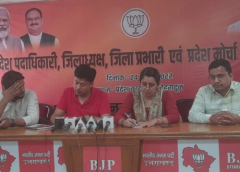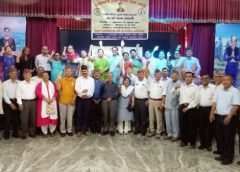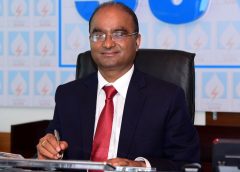Dehradun- 29 April 2022- The 15th evening of Virasat, held in the B.R. Ambedkar Stadium, Kaulagarh Road, began with performances by Layak Ram Jaunsar Bawar Sanskritik Rang Manch. They presented folk songs like Tandi, Harul and Jhenta, the famous dance of the Jaunsar tribe. Twenty-two artists under the able guidance of Layak Ramji took part in the performance and showcased the traditional clothing and costumes of Jaunsar and used traditional instruments of Uttarakhand like Ransingha and Dhol Damau.
Their first presentation was the traditional Parat Nritya – Dev Vandana, followed by Hathi Nritya, a dance performed in Jaunsar one month after Diwali since villagers are busy harvesting. Later, India’s famous Ghazal singer Talat Aziz gave his performance. He was born in Hyderabad in a family of music lovers and Urdu literature, and he took his initial training in music from Kirana Gharana. Ustad Samad Khan and later Ustad Faiyyaz Ahmed Khan trained him.
After the initial training, Aziz learnt music from the Ghazal maestro Mehdi Hassan. On many occasions, like on a US and Canada concert tour in 1986, he shared the stage with him at concerts in India and abroad. He sang in many films, composed music for TV serials, and acted in several. He released his first album in Feb 1980 with Jagjit Singh. Jagjit Singh composed this album titled Jagjit Singh presents Talat Aziz. In 1981, music director Khayyam Saheb introduced Talat Aziz in the classical film Umrao Jaan with the famous Ghazal, Zindagi Jab Bhi. Itwas followed by Bazaar, with Phir Chhidi Raat in collaboration with Lata Mangeshkar.
Talat Aziz sang the songs from the movies Baazar, Umrao Jaan and Daddy along with the traditional Ghazals including his ghazal, ‘Kaise Sukoon Paoon..’ from his first released Album composed by Sh. Jagjit Singh Ji. He paid tribute to his mentor Jagjit Ji. Later he performed Ghazal from Umrao Jaan, ‘Zindagi Jab Bhi Teri Bazm…’. Then, ‘Aaj Jane Ki Zid Na Karo…’, ‘Kabhi Khwab Mein…’ from Film Daddy, ‘Khubsurat Hai Ankhen Teri…’ and ‘Kal Chaudhvin Ki Raat Thi…’, a tribute to Jagjit Singh Ji.
He was accompanied by Jeetu Shankar on Tabla of Sa Re Ga Ma fame. The guitar was played by Ratan Prasanna, Keyboard by Ajay Soni, Flute by Atul Shanker while Harmonium was played by Talat Aziz Saab himself. Due to the scorching weather in Dehradun during this time of April, people were enjoying Kulfi and Shikanji every evening, as well as cultural programmes in Virasat. Virasat was dominated by Indian cuisine this time, with stalls dedicated to Rajasthani cuisine, Punjabi cuisine, Uttarakhand’s Pahadi meals, Hyderabad’s famous Biriyani, as well as Valpuri, Shikanji Kulfi, Pani Puri, and other dishes.
Virasat was the first such event in Dehradun after two years of lockdown, with people receiving a variety of services. People were shopping for fun as well as products associated with Indian culture in Virasat, and they were also spending time with their families in the evening.
Many types of Hyderabadi Biryani and Chicken dishes drew the attention of the youth in Indian cuisine, and hundreds of people flocked to the heritage courtyard for dinner every evening. Kids and adults were spotted going around with Kulfi in their hands at the festival.This time, the residents of Dehradun were treated to a wealth of Virasat as well as vibrant cultural performances. Craft Village, Food Festival, Classical Music and Dance, Folk Music and Dance, as well as Craft Work Shop, Vintage and Classic Car and Bike Rally and Quiz, and other events were among the highlights.
REACH was established in 1995 in Dehradun and has continued to organise the Virasat Festival ever since. Their aim is simply to preserve the value and essence of Indian art, culture and heritage and to bring these cultural values to the masses. Virasat has been instrumental in reviving many rural arts which were once on the verge of extinction due to a lack of an audience. The festival has played an essential role in preserving and reviving our village’s traditions, music, dance, crafts, painting, sculpture, theatre, storytelling, traditional cuisine, etc. and bringing them into practice in these modern times, because of which our classical and contemporary arts have started being recognised once again.



